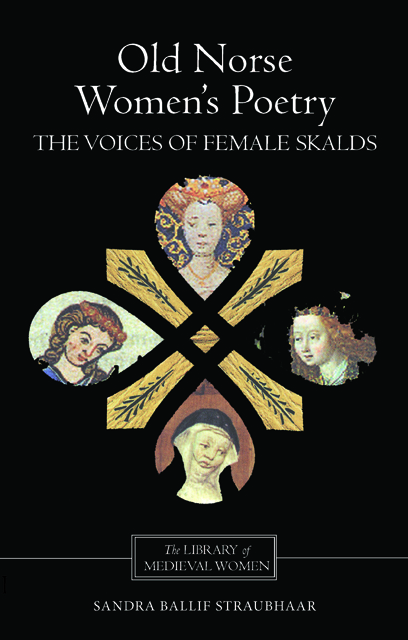Book contents
- Frontmatter
- Contents
- Foreword
- Abbreviations
- Introduction
- I. Real People, Real Poetry
- II. Quasi-Historical People and Poetry
- III. Visionary Women: Women’s Dream-Verse
- IV. Legendary Heroines
- V. Magic-Workers, Prophetesses, and Alien Maidens
- VI. Trollwomen
- Old Norse Literature Time Line
- Glossary of Personal Names
- Bibliography
- Index of Names
- Library of Medieval Women
V. - Magic-Workers, Prophetesses, and Alien Maidens
Published online by Cambridge University Press: 14 February 2023
- Frontmatter
- Contents
- Foreword
- Abbreviations
- Introduction
- I. Real People, Real Poetry
- II. Quasi-Historical People and Poetry
- III. Visionary Women: Women’s Dream-Verse
- IV. Legendary Heroines
- V. Magic-Workers, Prophetesses, and Alien Maidens
- VI. Trollwomen
- Old Norse Literature Time Line
- Glossary of Personal Names
- Bibliography
- Index of Names
- Library of Medieval Women
Summary
What many of the legendary skalds in this diverse section have in common with the equally loquacious (but more inhuman) trollwomen in Section VI is that their primary purpose in a given narrative is to serve as a speaking foil or a bearer of news to a male listener. The attitude of these legendary women skalds toward the said legendary heroes varies widely, from mild and flirtatious to pugnacious and hostile.
Some of the skalds in this section are valkyries or air-riding spirits, and some are giant-maidens, and thus only marginally human; these tend also to be foresighted prophetesses. Others are ordinary human women with a prophetic gift, or a skill for casting curses (or even magical weapons). Still others are simply out-of-town girls, despite the exotic features of the narratives they find themselves in. These last are thus the legendary or foreign equivalents of Egill Skalla-Grímsson’s playful interlocutors, found in Section II.
Skalds who are witches, pagan priestesses or prophetesses often address a reluctant or inimical male audience, as the foresighted Gunnhildr konungamóðir did (see Section I); those who have no such powers may (or may not) be met with a friendlier reception, presumably because they are less threatening figures.
One of the texts below comes from an Eddic poem of the Codex Regius, and one from the otherwise realistic world of the Icelandic family saga (Njáls saga, in this case); but the others are drawn from the liminal world of the legendary sagas, the fornaldarsögur (see the introduction to Section IV).
Heiðr vǫlva
Codex Regius GKS 2365 4to, late thirteenth century Neckel, Edda, rev. Kuhn, 5, stanza 22
Vǫluspá 22, the tasks of a seeress
I include this extract here because of its description of the work of a spákona (prophetess), as well as its mention of one prophetess’s multivalent name ‘Heiðr’ (Clear, or Bright, or Honor, or Heath – as in the home of heathens). This name is in fact applied to a number of spákonur in both poetry and prose. The common use of this name (or title? or term of opprobrium?) as designating a wise woman is perhaps traceable to this poem.
- Type
- Chapter
- Information
- Old Norse Women's PoetryThe Voices of Female Skalds, pp. 71 - 100Publisher: Boydell & BrewerPrint publication year: 2011



